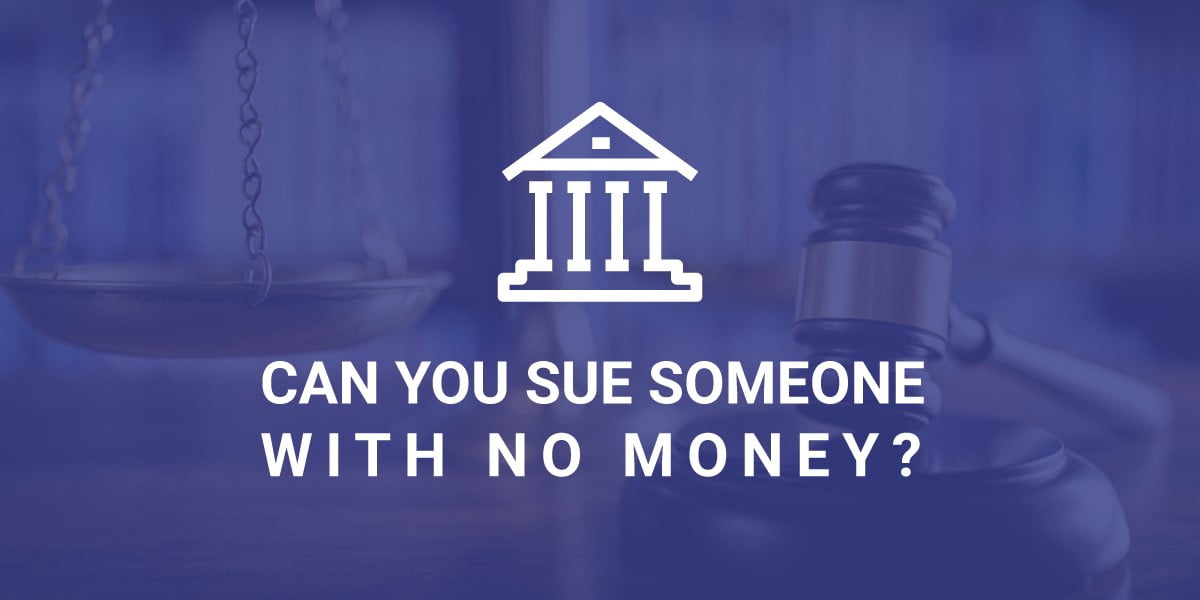Picture this: you’ve been wronged. Perhaps it’s a car accident, a breach of contract, or emotional distress. You’ve clearly established that you have a solid case. Yet, as you examine your options, a nagging question lingers: can you sue someone who has no money? It’s a tantalizing conundrum, isn’t it? This leads us to another inquiry—what happens when you secure a favorable judgment but the defendant’s coffers are empty?
Understanding the landscape of litigation demands an exploration of various elements. First, let’s dissect the fundamental notion of suing someone. Legally speaking, engaging in a lawsuit requires a substantively valid claim. This presupposes that the defendant possesses the resources to provide compensation should the judge rule in your favor. However, the reality is more complicated. Are you willing to pursue a case when it’s obvious your opponent lacks financial means? You might be asking, “Is it worth my time and investment?”
When determining whether to initiate legal action against someone with little to no financial capital, the most pressing aspect to consider is the viability of recovery. The legal system is designed to address grievances, but it also operates on the principle of recovery—meaning that a judgment without the potential for collection may feel rather hollow. If you win your case, what good is it if the person has no money to pay?
Next, contemplate your judicial strategy. Litigation can be exhaustive and costly, often requiring fees that accumulate with each court appearance and legal consultation. Thus, a crucial deliberation arises: do the potential benefits of winning outweigh the expenditures incurred throughout the process? If the likelihood of collecting from the debtor is slim, it might be prudent to reconsider your approach.
Nevertheless, if you’re determined to pursue legal action regardless of the financial state of your opponent, it is essential to understand the possibilities available to you. One potential avenue is seeking a judgment that can be enforced later when the individual’s financial situation improves. This could serve as a proverbial waiting game, though it requires patience and strategic foresight.
Alternatively, if the defendant is employed, you could explore wage garnishment options. This legal mechanism permits you to seize a portion of the debtor’s income directly from their paycheck, facilitating collection incrementally over time. It’s an avenue worth considering, but it also comes with its own set of challenges.
What about other forms of assets? While the individual may have limited financial resources, they may possess property or valuables that can be leveraged for debt repayment. If a lawsuit is successful, you may inquire into potential liens against their assets. This layer of complexity can propel your efforts forward, despite initial appearances suggesting a lack of recoverable funds.
Even so, approaching litigation against someone with limited resources invites room for consideration. What if you sought an alternative avenue for resolution instead? Mediation or arbitration could serve as effective alternatives, allowing both parties to engage in a more conciliatory dialogue. By negotiating directly or through a neutral third party, you might come to an amicable settlement without incurring the dreaded costs of a drawn-out trial.
Yet another consideration: small claims court. If the amount at stake is within the parameters defined by small claims jurisdiction, such venues allow for simpler procedures, less formalities, and reduced costs. In effect, this can serve as a pragmatic entry point for individuals seeking resolution without extensive financial burden.
A vital aspect of this discussion is understanding consumer protection laws. Certain legal provisions are designed to assist individuals in collecting debts. Delving into the realm of local legislation might unveil resources and organizations that can aid your efforts, possibly circumventing some of the hurdles typically associated with litigation. This becomes especially useful if the debtor’s financial situation is in flux.
Moreover, consider the ethical implications. What could it mean to pursue payment from someone who lacks financial resources? Is it merely an exercise in frustration, or will it yield a deeper sense of justice? Striking the balance between vindication and compassion stands as a philosophical challenge. On one hand, you seek what is rightfully yours; on the other, the pursuit could yield minimal satisfaction at great cost to both parties.
Ultimately, the journey through the labyrinthine corridors of litigation against a cash-strapped defendant nudges us toward thoughtful introspection. It prompts a reflection on the pursuit of justice versus the pursuit of resources. Understanding what drives your decision to engage in a lawsuit—and the potential long-term ramifications of that path—will empower you significantly more than knowing the mechanics of the legal system.
While you can certainly initiate a lawsuit against someone who appears financially unviable, the complexities that accompany such a decision are substantial. The conversation isn’t just about the money; it’s about the underlying principles, emotional energies, and the quest for resolution. Evaluating the scenario with a multidisciplinary perspective will help clarify the best course of action. So, are you ready to take on the challenge?”
